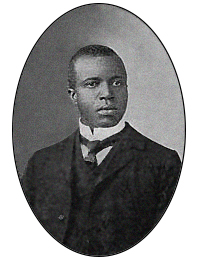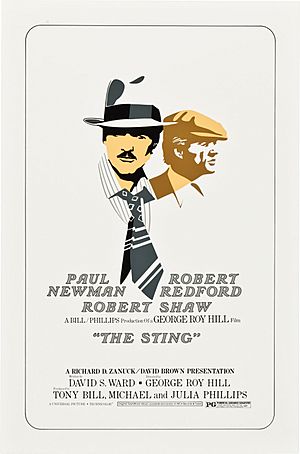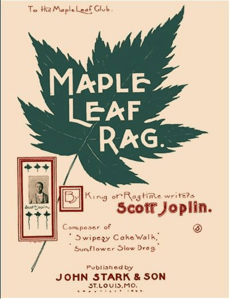Scott Joplin facts for kids
Quick facts for kids
Scott Joplin
|
|
|---|---|

Joplin in 1903
|
|
| Born | November 24, 1868 Texarkana, Texas, U.S., or Linden, Texas, U.S. (disputed)
|
| Died | April 1, 1917 (aged 48) Manhattan, New York City, U.S.
|
| Burial place | St. Michael's Cemetery |
| Education | George R. Smith College |
| Occupation |
|
| Years active | 1895–1917 |
| Spouse(s) |
Belle Jones
(m. 1899; div. 1903)Freddie Alexander
(m. 1904; died 1904)Lottie Stokes
(m. 1909) |
| Awards | Pulitzer Prize (posthumous, 1976) |
| Signature | |
Scott Joplin (around 1868 – April 1, 1917) was an American composer and pianist. He became very famous for his ragtime music. People called him the "King of Ragtime." One of his first and most popular songs was the "Maple Leaf Rag." This song became the first big hit in ragtime music and helped make the style popular.
Contents
Early Life and Musical Beginnings
Joplin was born in Texas, U.S. His father, Giles Joplin, was a former slave. His mother, Florence Givens, was born free. Scott was the second of six children. Most people believe he was born on November 24, 1868.
Around 1880, his family moved to Texarkana, Arkansas. His father worked on the railroad, and his mother cleaned houses. Joplin's father played the violin, and his mother sang and played the banjo. Scott learned some music from his family. From age seven, he could play the piano while his mother worked.
In the early 1880s, his father left the family. His mother worked hard to support the children. She supported Scott's interest in music. His father wanted him to choose a more practical job.
Scott was a serious and hardworking young person. He studied music and played piano after school. Some local teachers helped him. But most of his music lessons came from Julius Weiss. Weiss was a German-born music professor. He had moved to Texas in the late 1860s. Weiss was very impressed by Joplin's talent. He taught Scott for free from ages 11 to 16. He taught Joplin about folk and classical music, including opera.
Weiss helped Joplin see music as an "art" and not just for fun. He also helped Scott's mother buy a used piano. Joplin never forgot Weiss. Later, when Joplin was famous, he sent money to his old teacher. When he was 16, Joplin sang in a group with three other boys. He also taught guitar and mandolin.
Joplin's Music Career
As a teenager, Joplin worked on the railroad. In the late 1880s, he left that job. He traveled around the American South as a musician. He went to Chicago to play at the World's Fair of 1893. This event helped make ragtime music very popular by 1897.
In 1894, Joplin moved to Sedalia, Missouri. He taught piano there. He taught other future ragtime composers like Arthur Marshall and Scott Hayden. He started publishing his music in 1895. His song "Maple Leaf Rag" was published in 1899. This song made him famous. It also gave him a steady income for the rest of his life.
In 1901, Joplin moved to St. Louis. He kept writing and publishing music. He also performed often. In 1903, the music for his first opera, A Guest of Honor, was lost.
In 1907, Joplin moved to New York City. He wanted to find someone to produce a new opera. He tried to create music beyond ragtime. But he did not have much money success with it. His second opera, Treemonisha, was never fully performed during his lifetime.
Joplin's Family Life
In 1901, Joplin married his first wife, Belle Jones. She was the sister-in-law of Scott Hayden. In 1903, Joplin's only child, a daughter, died. Joplin and Belle then separated.
In June 1904, Joplin married Freddie Alexander. She was the young woman he wrote "The Chrysanthemum" for. Freddie died on September 10, 1904. She passed away from problems after catching a cold. This was only ten weeks after their wedding. "Bethena" was Joplin's first song after Freddie died. One writer called it a "beautiful piece" and one of the best ragtime waltzes.
In 1907, Joplin moved to New York City. He thought it was the best place to find a producer for his new opera. After moving, Joplin met Lottie Stokes. They married in 1909. Lottie was his wife until he died in 1917.
The End of His Life
By 1916, Joplin was very sick. On February 2, 1917, he went to a mental hospital. The "King of Ragtime" died there on April 1, 1917. He was 48 years old. He was buried in a pauper's grave, which means it had no marker for 57 years. His grave is at St. Michael's Cemetery. It finally got a marker in 1974. That same year, the movie The Sting, which used his music, won an Oscar.

Many people believe Joplin's death marked the end of ragtime music's main popularity. Over the next few years, ragtime changed. It mixed with other styles to become stride, jazz, and later, swing.
Joplin's Lasting Impact
Joplin's music became popular again in the early 1970s. This happened when Joshua Rifkin released a very successful album of his music. After that, the 1973 movie The Sting won an Academy Award. The movie featured several of Joplin's songs. The most famous was "The Entertainer". This song was played by pianist Marvin Hamlisch and was heard everywhere. Joplin's opera Treemonisha was finally performed completely in 1972. In 1976, Joplin was given a special Pulitzer Prize after his death.
Scott Joplin House Museum
Joplin rented a home in St. Louis from 1900 to 1903. This house became a National Historic Landmark in 1976. The local African American community saved it from being torn down. In 1983, the Missouri Department of Natural Resources made it the first state historic site in Missouri about African American history. At first, it focused only on Joplin and ragtime music. Now, it also tells the story of Black people moving to cities and how neighborhoods changed.
Cool Facts About Scott Joplin
- During his career, he wrote over 40 original ragtime songs. He also wrote one ragtime ballet and two operas.
- Joplin never made a sound recording himself. But his playing is saved on seven piano rolls. These were for mechanical player pianos. All seven were made in 1916.
- Joplin also wrote a symphony, but the music for it has been lost.
Awards and Special Recognition
- 1970: Joplin was added to the Songwriters Hall of Fame.
- 1976: Joplin received a special Pulitzer Prize. It was given after his death for his important contributions to American music.
- 1977: A movie called Scott Joplin was made. It starred Billy Dee Williams as Joplin.
- 1983: The United States Postal Service released a stamp with Joplin's picture. It was part of their Black Heritage series.
- 1989: Joplin received a star on the St. Louis Walk of Fame.
- 2002: A collection of Joplin's own performances on piano rolls was added to the Library of Congress National Recording Registry. This group chooses songs that are "culturally, historically, or aesthetically important."
- 2012: A crater on the planet Mercury was named in his honor.
Images for kids
-
Scott Joplin House in St. Louis, Missouri
-
A commemorative plaque to Joplin in Texas
-
Joplin's star on the St. Louis Walk of Fame
See also
 In Spanish: Scott Joplin para niños
In Spanish: Scott Joplin para niños
 | Kyle Baker |
 | Joseph Yoakum |
 | Laura Wheeler Waring |
 | Henry Ossawa Tanner |











